The Complete Guide to Australian Beneficial Insect Retailers: Natural Pest Control for Port Macquarie and NSW Gardens
- Clint Mcmaus

- Sep 13
- 14 min read
Updated: Sep 26
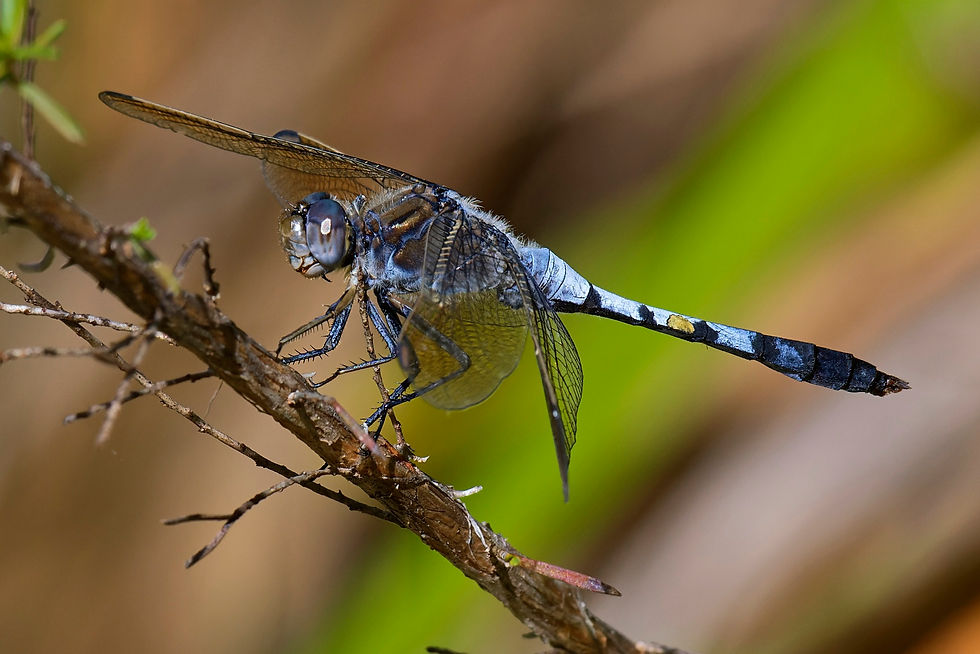
Table of Contents
Introduction
Across Port Macquarie and the wider Mid North Coast of New South Wales, gardeners and growers are increasingly embracing natural alternatives to chemical pest control. Beneficial insects such as lacewings, ladybirds, parasitoid wasps, predatory mites and nematodes are capable of suppressing common garden pests when provided with the right habitat and conditions. Purchasing these insects has become easier thanks to specialist Australian retailers that breed and ship live beneficial species. This guide introduces the major retailers, outlines what each insect is used for, and explains the basics of handling, shipping and habitat preparation.
Using beneficial insects is not a quick fix: success depends on understanding the pests you are targeting, selecting the right predator or parasite, and providing an environment where the released insects can survive. For each retailer listed below you will find the target pests, type of product sold (eggs, larvae, adults), price range, shipping information and state restrictions. Following each section are habitat tips to help ensure that your investment yields lasting results in Port Macquarie or elsewhere in NSW.
For more information about each beneficial insect, see our other blog post (link below).
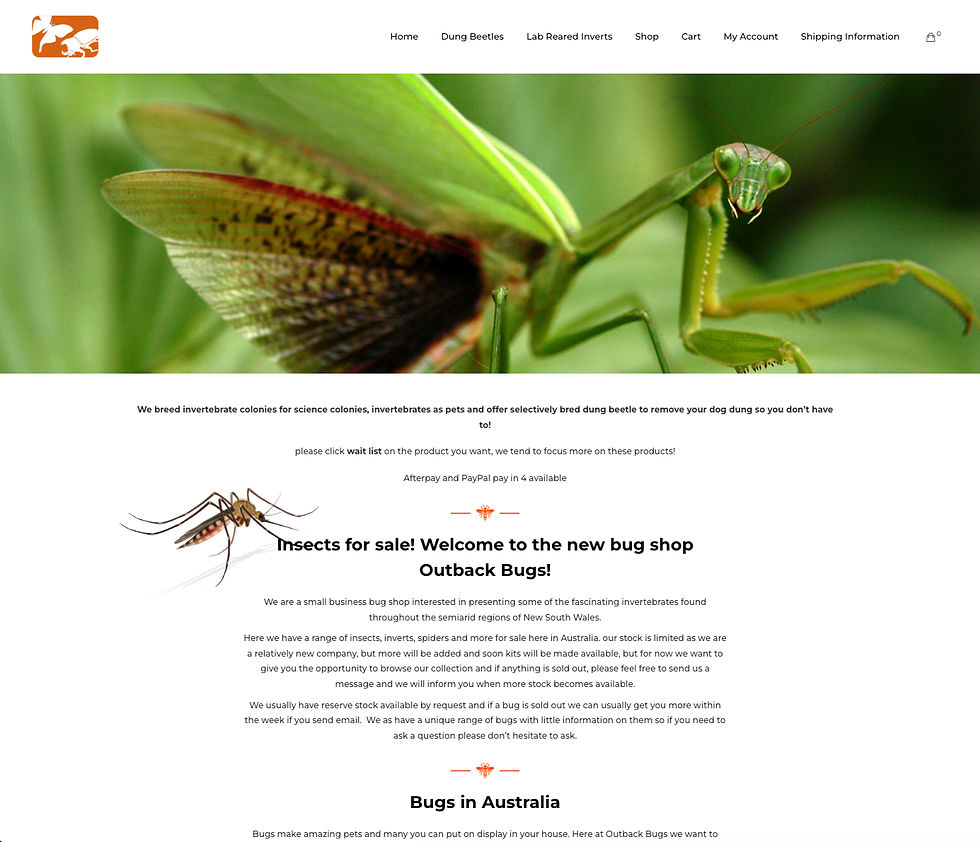
Why Beneficial Insects Matter
Beneficial insects help to maintain natural balance in the garden by attacking pest insects at different stages of their life cycle. Lacewings and ladybirds devour aphids, caterpillars and mealybugs, while parasitoid wasps lay eggs inside pest eggs or larvae, eventually killing the host. Predatory mites feed on spider mites, thrips and fungus gnat larvae, and beneficial nematodes hunt soil‑dwelling pests such as curl grubs and fungus gnat larvae.
These natural enemies offer an environmentally friendly alternative to chemical pesticides and support biodiversity by attracting other wildlife such as pollinators. Government guidance emphasizes that biological control agents are a key component of integrated pest management and must be used alongside cultural practices such as good sanitation and careful pesticide selection https://www.dpi.nsw.gov.au.
In Port Macquarie and across NSW, using beneficial insects can reduce reliance on broad‑spectrum pesticides, protect beneficial pollinators and improve soil health. Because most species sold by retailers are native or established in Australia, releasing them within their recommended range does not pose the same ecological risk as releasing exotic species. Nonetheless, always check state regulations and retailer guidelines before purchase.
How to Support Beneficial Insects in Your Garden
Buying beneficial insects is only half the job; the other half involves modifying your garden environment to help them thrive. Most predators and parasitoids require nectar, pollen, shelter and moisture in addition to prey.
Planting a diversity of flowering herbs such as coriander, dill, alyssum, yarrow and native shrubs provides nectar for adult lacewings, ladybirds and parasitoid wasps. Creating dense plantings or hedges offers shelter from wind and predators, while mulching and regular watering maintain humidity for predatory mites and nematodes.
Shallow dishes filled with pebbles and water give insects a safe place to drink. Avoid broad‑spectrum pesticides, which can kill beneficials outright or disrupt their food supply. Instead, practise targeted control methods and consider using low‑impact products that are compatible with biological control.

Habitat suggestions by insect type
Lacewings: Flowering herbs and shrubs for nectar; avoid disturbing soil when eggs or larvae are present. Release eggs near aphid‑infested plants; adults need pollen, honeydew and shelter.
Ladybirds: Diverse garden structure with flowering plants and shrubs; provide groundcover for shelter; avoid heavy pesticide use.
Predatory mites: Moist environments with leaf litter or mulch; reduce dust; use overhead watering or misting to raise humidity.
Nematodes: Apply to moist soil in the evening; keep soil damp for two weeks after application; avoid extreme heat or chemicals.
Mantids: Tall grasses or shrubs for perching; diverse insect prey; avoid clearing all leaf litter.
Parasitoid wasps: Plant flowering herbs for nectar; avoid broad-spectrum pesticides; use selective control methods.
These recommendations apply broadly across NSW, but microclimates differ: adjust watering and plant selection to suit Port Macquarie’s coastal climate.
Quick Reference Table - Beneficial Insects & Suppliers
Directory of Australian Beneficial Insect Retailers
Bugs for Bugs (Queensland) - https://bugsforbugs.com.au
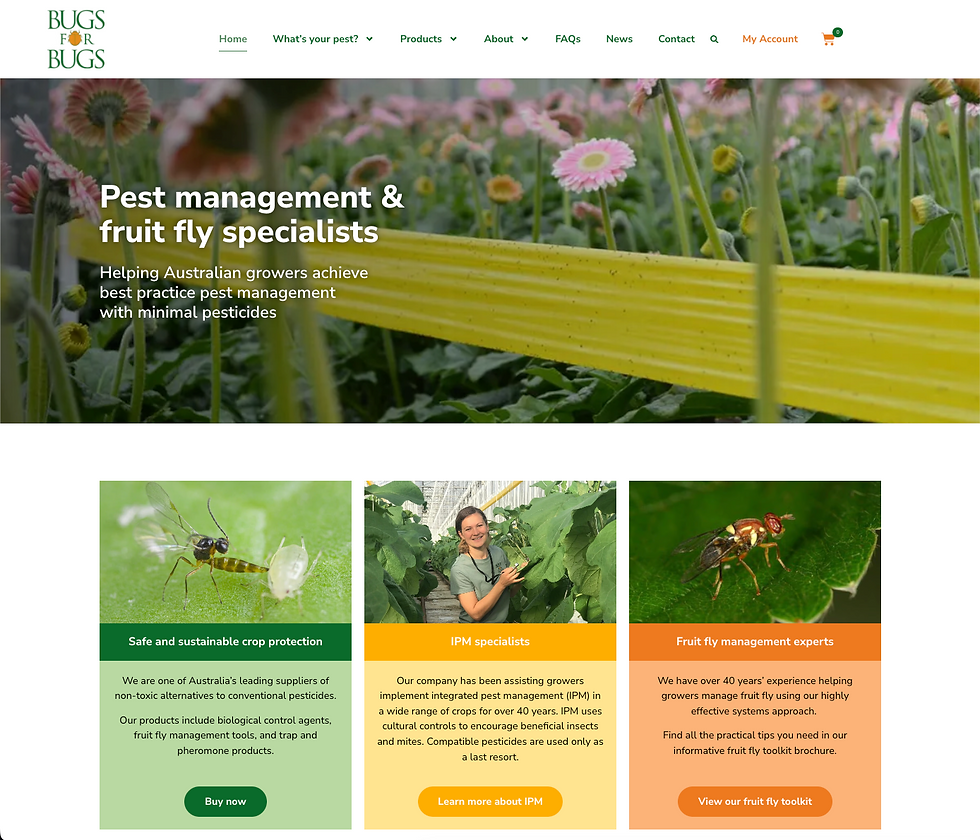
Bugs for Bugs is one of Australia’s best‑known suppliers of beneficial insects. They offer green lacewings (Mallada signatus) for control of aphids, caterpillars, mealybugs and scale insects. Lacewings are sold as eggs, available in packs of 500 or 2,000, and hatch within days. The eggs are provided in a carrier medium of rice hulls along with sterilized moth eggs for larvae to feed on. A garden pack includes release boxes and sticky traps. Price ranges start around AU$36–$40 for 500 eggs and increase for larger packs. They also supply spotted ladybirds (Harmonia conformis) for aphid control. Ladybirds are available as 30 adult beetles or 150 eggs per pack; the price is approximately AU$40 and they recommend using beetle bags when releasing. Bugs for Bugs sells Cryptolaemus montrouzieri (“mealybug destroyer”), a predatory ladybird for mealybugs and soft scale insects. Cryptolaemus is supplied as adult beetles (packs of 100) or larvae (packs of 50 or 200). Prices range from AU$39 to over AU$70 depending on quantity.

Parasitoid wasps are also available, including Trichogramma pretiosum for caterpillar control, supplied in packs of 30,000 or 60,000 wasps on release sheets. These tiny wasps target moth eggs and are effective against heliothis and other caterpillar pests.
Bugs for Bugs ships orders across all states and territories, though some products have restrictions; delivery takes approximately 3–5 business days. To protect viability, shipments are generally dispatched early in the week and may include ventilation holes or food to sustain the insects during transit.
Habitat & pest advice: For aphids and soft scale, use a combination of lacewing eggs and ladybirds. Release eggs near infestations; adult ladybirds can be introduced directly onto plants. Provide nectar plants such as dill and coriander for adults and avoid applying pesticides that harm larvae. For mealybugs on indoor plants or citrus, Cryptolaemus is an effective predator; maintain moderate humidity and avoid ant infestations, which protect mealybugs.
Backyard Buddies (Eco Organic Garden) - https://www.ecoorganicgarden.com.au/products/backyard-buddies/

Backyard Buddies is marketed through Eco Organic Garden and is designed for home gardeners who want simple biological control solutions. Their range typically includes lacewing eggs, predatory mites and ladybirds, though product pages vary. According to the brand overview, each insect comes with easy‑to‑follow instructions and is packaged with suitable food and carrier medium.
The website states that lacewings (sold under the name “Gracey”) target aphids, mealybugs and caterpillars; predatory mites (“Pete”) control plant‑damaging mites; and ladybirds (“Linda”) are for mealybug suppression. Prices generally start around AU$30–$40 per release.
Backyard Buddies ships orders Australia‑wide, but seasonal availability and weather conditions may affect dispatch times. Because the products are aimed at home gardeners, pack sizes are smaller than those from commercial suppliers.
Habitat & pest advice: Use Gracey lacewings for aphid outbreaks on roses and vegetables; provide flowering herbs as nectar sources. For spider mites on houseplants or cucumbers, release Pete predatory mites and ensure high humidity. Linda ladybirds work best against mealybugs on citrus and ornamentals; avoid ant infestations and provide pollen plants.
GoodbugShop - https://goodbugshop.com.au
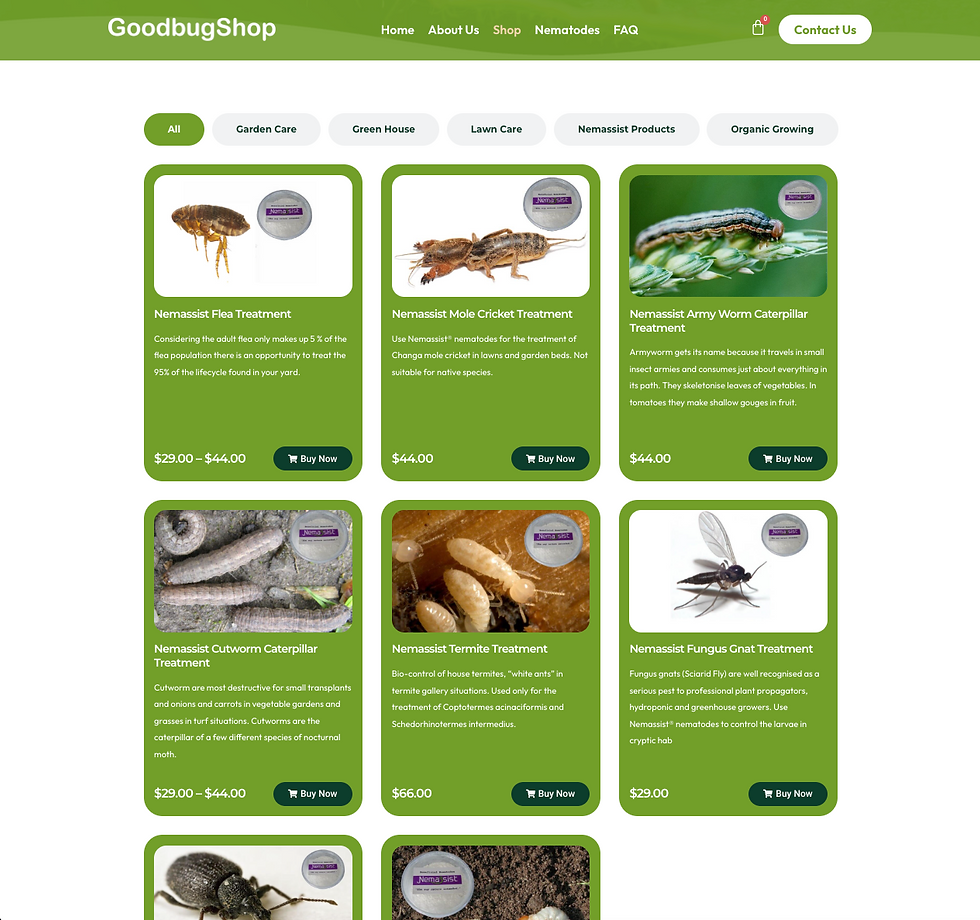
GoodbugShop specialises in beneficial nematodes and other biological products. Their flagship “Nemassist” range includes species such as Steinernema carpocapsae for flea and soil pest control. The shipping & returns page explains that orders are dispatched via premium courier in foam boxes with a door‑to‑door tracking service. Nematodes are shipped with an ice pack to keep them cool and the ice may be melted on arrival but the nematodes remain viable.
Shipments are sent on Mondays and Tuesdays (Wednesdays for metropolitan areas) and usually arrive within two days; orders must be placed by noon for same‑day shipping. Shipping costs vary with weight: up to 500 g costs AU$11.50, 500 g–3 kg costs AU$16.50 and 3 kg–5 kg costs AU$22.50.
Beneficial nematodes are sold as concentrated suspensions containing millions of infective juveniles. For example, the Nemassist Flea Treatment treats 75–150 m² by applying 35 million nematodes. Prices range around AU$29–$44 for small packs and up to AU$100 for larger volumes. Because nematodes are living organisms, they must be refrigerated and used promptly.
Habitat & pest advice: Nematodes are ideal for controlling soil‑dwelling pests such as curl grubs, black beetle larvae, lawn armyworm and fungus gnat larvae. Apply them to moist soil in the evening and irrigate afterwards to wash them in; keep soil damp for two weeks. Avoid chemical insecticides or high temperatures during application. Beneficial nematodes are safe for pets and humans and can provide long‑term control because they reproduce in the soil.
BioWorks (New South Wales) - https://bioworksonline.com.au
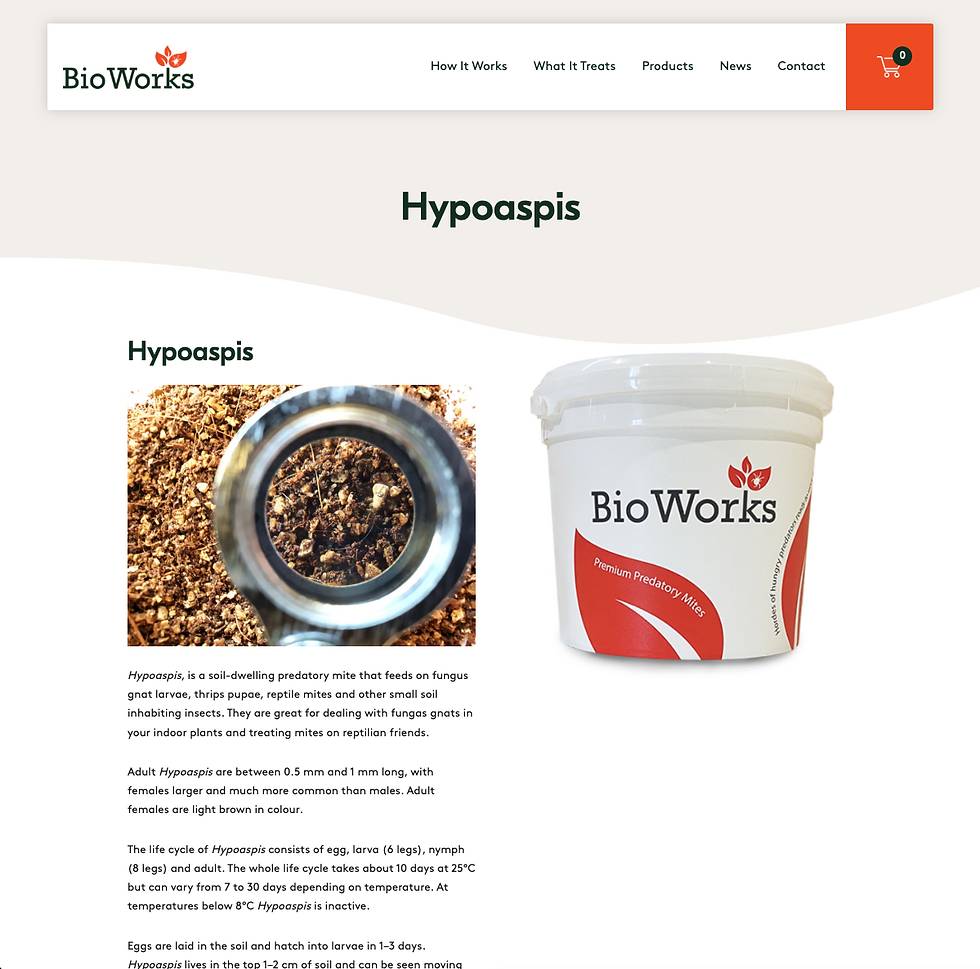
BioWorks, based in NSW, produces several species of predatory mites used for greenhouse and outdoor pest control. Their Premium Persimilis product contains Phytoseiulus persimilis mites for controlling two‑spotted spider mites. Each bucket contains between 4,000 and 10,000 mites and costs AU$66.50–$947 depending on quantity. The company notes that due to quarantine restrictions they cannot ship Persimilis to Western Australia and that customers must confirm before purchasing.
BioWorks also offers Hypoaspis (now Stratiolaelaps scimitus) for fungus gnat larvae and thrips pupae. Each litre contains about 30,000 predatory mites with prices ranging from AU$61 to $271. These mites live in the soil and attack fungus gnat larvae, thrips pupae and reptile mites. Their Cucumeris product contains Neoseiulus cucumeris, a generalist predator for thrips; one litre contains 100,000 mites and costs AU$46.65–$343.10.
All BioWorks products are packaged in a vermiculite or bran carrier that can be sprinkled onto plants or soil. They emphasise that shipments must be kept cool and used immediately upon arrival. Because these mites are live, they are shipped only early in the week to minimise transit time.
Habitat & pest advice: For two‑spotted spider mites on beans, cucumbers or ornamentals, release Premium Persimilis and maintain high humidity. Hypoaspis are ideal for fungus gnat larvae in potting mix; avoid over‑watering but maintain moderate moisture. For western flower thrips in capsicums or roses, Cucumeris can provide excellent control when released regularly. Always check that your state allows import of these mites; for WA customers, BioWorks indicates that Persimilis cannot be shipped.
BioResources (Queensland) - https://bioresources.com.au
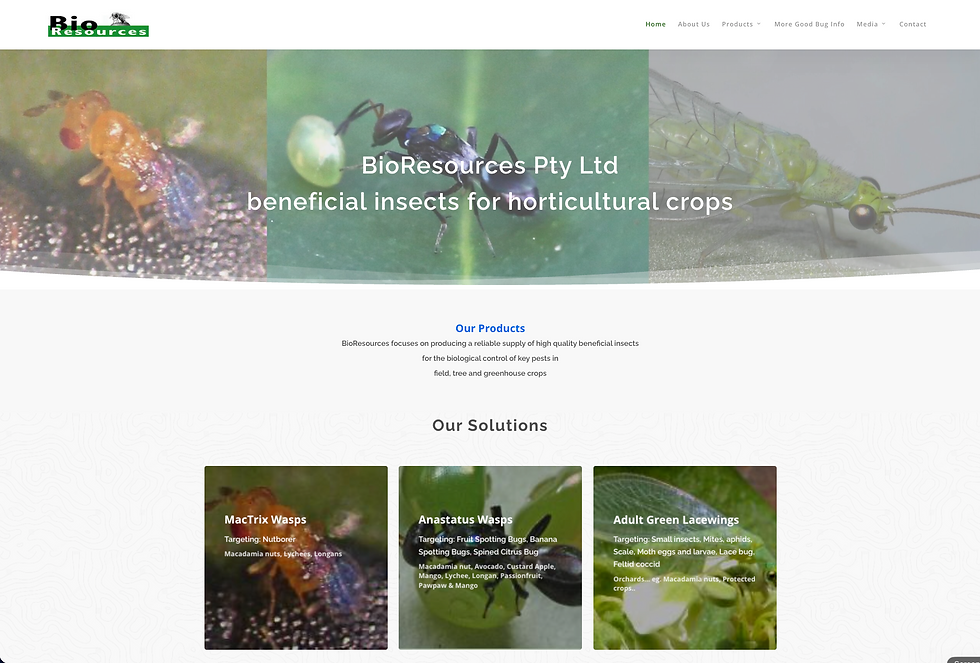
BioResources supplies beneficial insects primarily for commercial horticulture but some products are available to home gardeners. They sell Adult Green Lacewings in packs of 200+ adults. These lacewings are dispatched via Australia Post Express Post on Tuesdays to arrive on Wednesday or Thursday. The company asks customers to contact them for pricing and to order several months ahead because colonies are built to order.
When shipping, they emphasize that the container should not be exposed to heat and must be used soon after arrival. BioResources also produces parasitoid wasps, such as MacTrix (for macadamia nutborer) and Anastatus (for fruit spotting bug), but pricing is not displayed online.
Because their primary clientele is commercial growers, BioResources may require minimum orders and there may be restrictions on shipping to certain states depending on quarantine regulations. Customers should contact them directly for up‑to‑date information.
Habitat & pest advice: Adult lacewings are generalist predators and will eat aphids, mealybugs, caterpillars and other soft‑bodied insects. Provide flowering shrubs for nectar and release them near infested plants in the evening. For specific pests like nutborer or citrus bug, follow BioResources’ guidelines and ensure chemical sprays are compatible with the parasitoid species.
Biological Services (South Australia) - https://biologicalservices.com.au

Biological Services is a large provider of beneficial insects for commercial and horticultural clients. Their product range includes predatory mites such as Cucumeris, Montdorensis, Persimilis, Doreen, Californicus and Hypoaspis.
An article on their website describes Montdorensis predatory mites as high‑concentration thrips and whitefly predators produced using improved rearing techniques that achieve densities over 100,000 mites per litre. This high density reduces the labour and freight costs associated with shipping predators over long distances.
Biological Services also supplies parasitoid wasps for greenhouse whitefly and aphid control. Prices vary depending on species and order volume; they supply both small quantities for hobby growers and bulk volumes for commercial farms. Since many of their products are living organisms, they ship early in the week and may have state‑specific restrictions. Contact them directly for pricing and availability.
Habitat & pest advice: Use Montdorensis or Cucumeris for thrips and whitefly in greenhouse tomatoes or ornamentals. Maintain high humidity and avoid dust. For spider mites, Persimilis is effective; for soil pests like fungus gnats, Hypoaspis works well. Provide pollen sources and avoid broad‑spectrum pesticides.
Outback Bugs (New South Wales) - https://www.outbackbugs.com.au
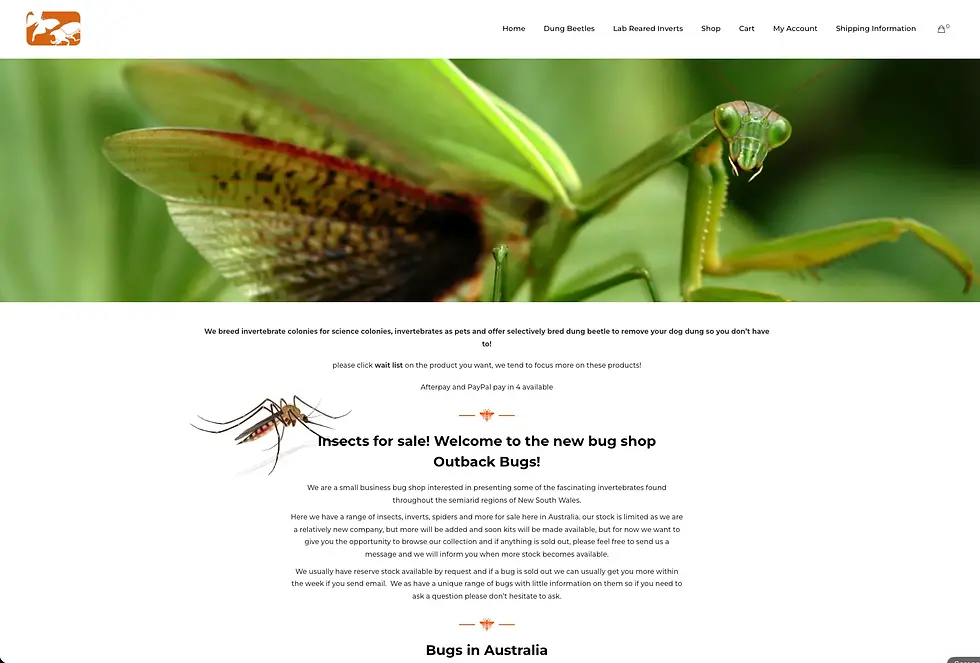
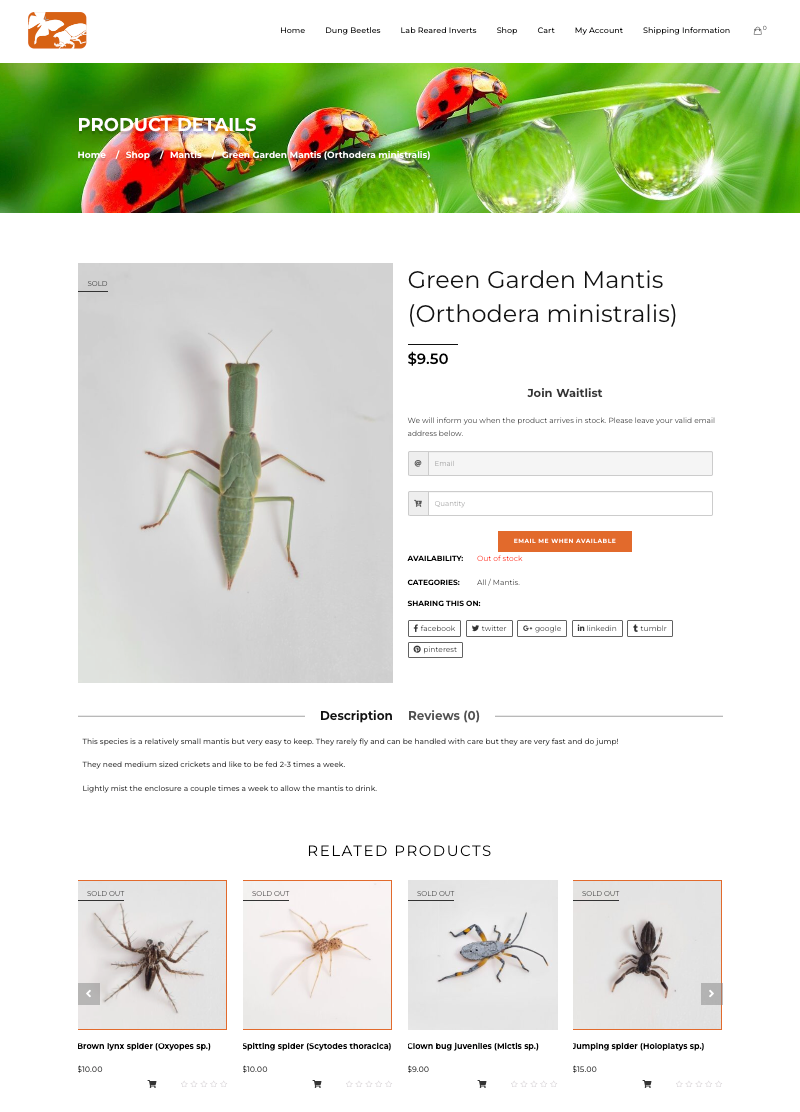
Outback Bugs is a small NSW‑based business that breeds mantids, stick insects and other invertebrates for hobbyists. Their shipping information notes that live insects are shipped via Australia Post on Mondays to ensure arrival by Wednesday, while orders without live insects may ship the next day. They do not ship to Northern Territory (NT) or Tasmania, and at present they do not ship to Western Australia (WA).
Customers may request insurance for orders over AU$100. They encourage buyers to familiarize themselves with state laws and note that all sales are final with no liability for injuries or incorrect addresses.
Outback Bugs sells native mantids such as the Green Garden Mantis; prices for juvenile mantises range from AU$20–$50 depending on size. They may also sell mantis oothecae (egg cases) during breeding season. Mantids are generalist predators that feed on any insect they can catch and may help control grasshoppers, moths and flies.
Habitat & pest advice: Green Garden Mantids need tall grasses, shrubs or small trees for perching. Encourage diverse insect populations by planting native grasses and wildflowers. Because mantids are opportunistic predators, they may also eat beneficial insects; use them sparingly as part of a broader IPM strategy.
Minibeast Wildlife Bug Shop (Queensland) - https://shop.minibeastwildlife.com.au/pets/
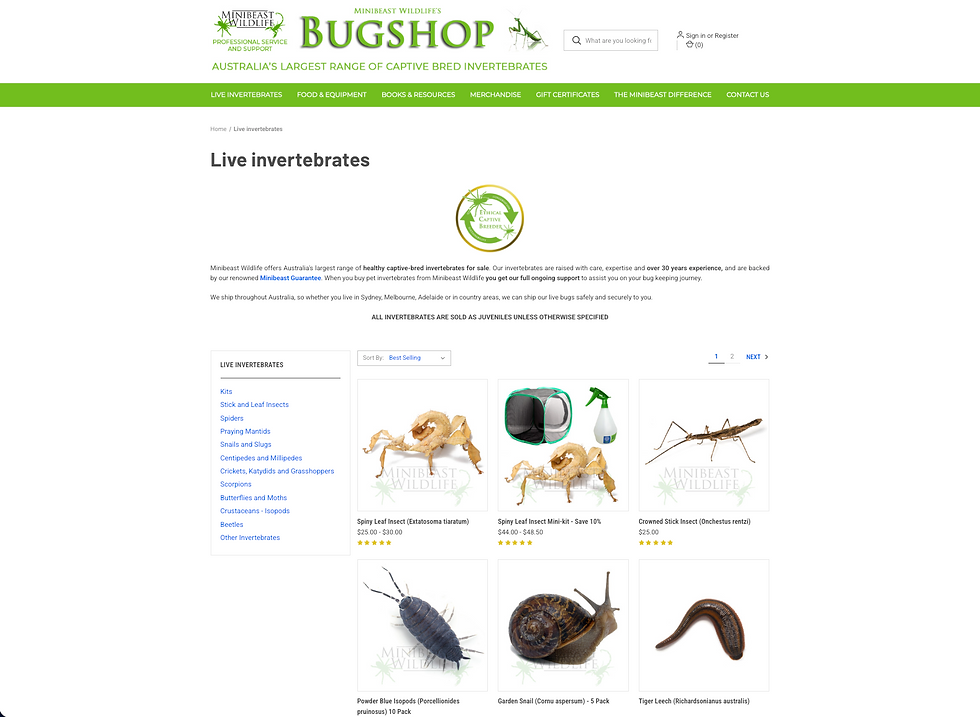
Minibeast Wildlife is a leading supplier of captive‑bred invertebrates for hobbyists and educational programs. Their range includes tarantulas, stick insects, cockroaches and praying mantises. While not primarily focused on pest control, some species such as mantids can help reduce insect numbers in gardens.
The shipping page explains that live animals are shipped Australia‑wide except Tasmania; orders are dispatched each Monday after payment and usually take two to three days to arrive.
Shipping for live animals costs about AU$18.50 and there is a quarantine inspection fee for Western Australian customers; orders cannot be sent to Tasmania because of local regulations. Non‑living items are shipped on Mondays by regular post.
Prices for mantis kits and other pet insects range from about AU$20 up to AU$75 depending on species and stage. Customers should note that these insects are intended for hobby use and may not be appropriate for pest control in outdoor gardens.
Habitat & pest advice: Praying mantises require upright structures to climb and feed, such as tall herbs or shrubs. They are generalist predators and should be introduced carefully; releasing them may reduce populations of both pests and other beneficial insects. Always check state regulations, as some exotic species cannot be released outdoors.
Bug Frenzy (South Australia) - https://bugfrenzy.com.au
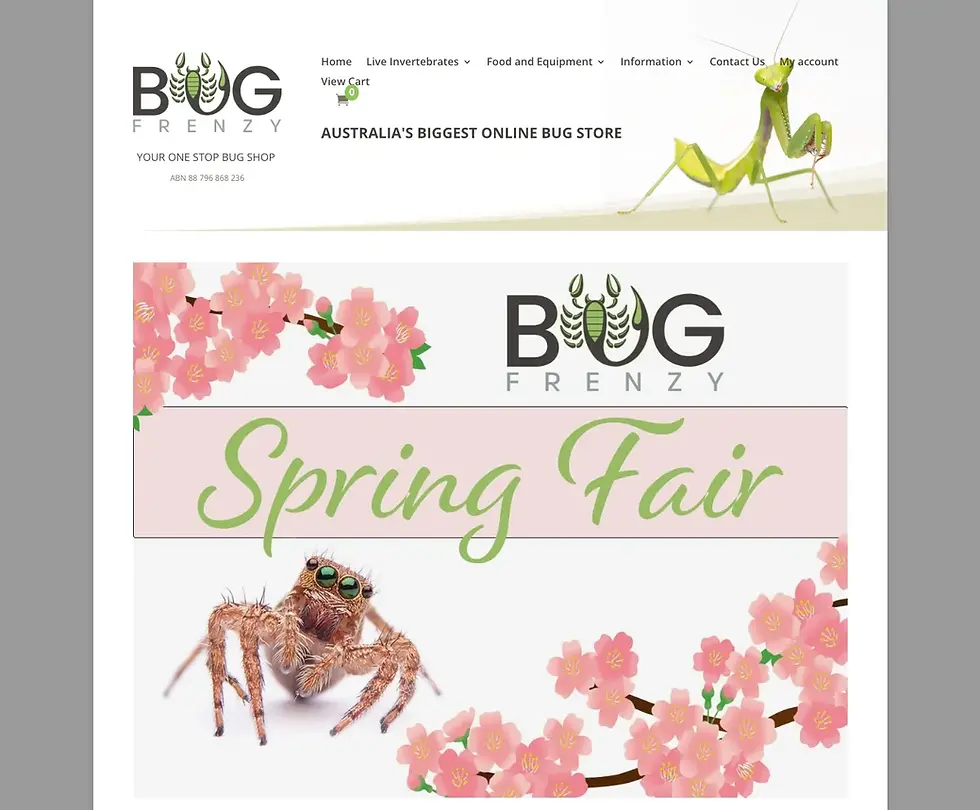
Bug Frenzy specialises in captive‑bred invertebrates for hobbyists and educational collections. Their shipping policies are strict: live invertebrates are dispatched on Mondays, sometimes Tuesdays, using Express Post; they require a signature on delivery and must be collected within 24 hours or the seven‑day guarantee is void. They no longer ship to parcel lockers and ask customers to contact them if there is no tracking update by Wednesday. They do not ship live insects to Western Australia, Northern Territory or Tasmania without appropriate permits.
Products include mantids, native cockroaches, beetles and stick insects. The Grass Mantid (Archimantis latistyla) juvenile is priced at around AU$22–$37 depending on size. Packaging is eco‑friendly and designed to keep animals secure. Because these species are sold as pets, they are not specifically bred for pest control, though mantids can help reduce insect populations in a garden.
Habitat & pest advice: Grass Mantids thrive in mixed plantings with tall grasses and shrubs. Provide perching sites and avoid spraying pesticides. Because mantids are generalist predators, they may reduce populations of both pests and beneficial insects; use them as a supplement to other control strategies.
Bugs Alive (Queensland) - https://bugsalive.com.au
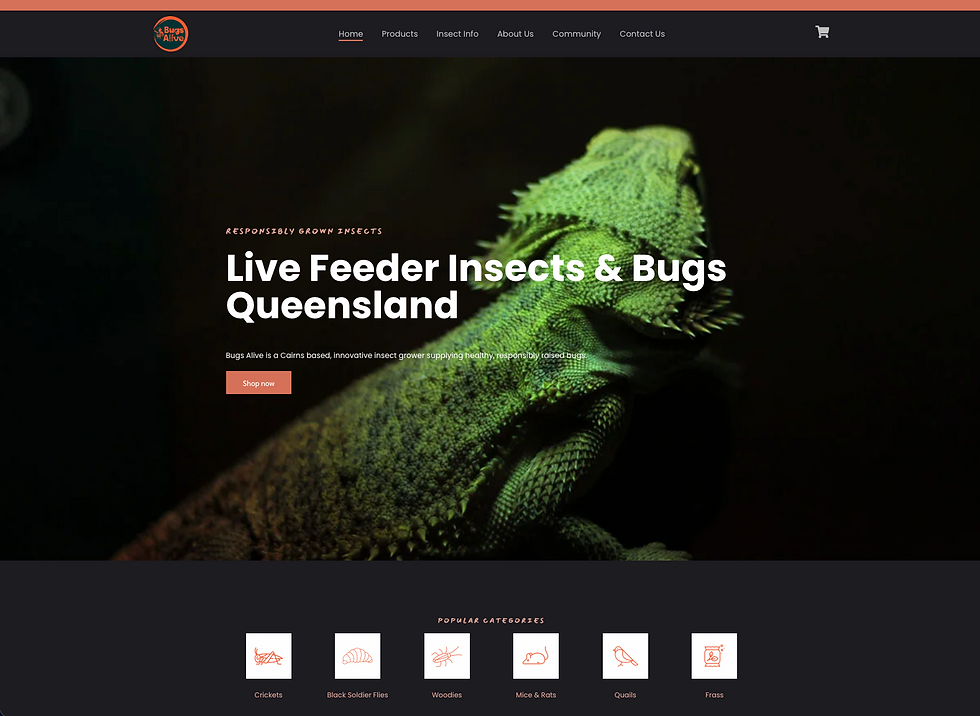
Bugs Alive is a Queensland‑based producer of live feeder insects and rodents for reptile and amphibian owners. Their website emphasizes that the insects are raised on fresh fruit and grain and shipped quickly to ensure high survival rates. They do not post live insects or frozen products to some areas due to lengthy freight times; such areas are identified at checkout. For frozen items outside Queensland, customers must request a manual freight quote.
While they occasionally stock mantids, their primary offerings include crickets, wood roaches and black soldier fly larvae. Prices start at about AU$10–$20 for small tubs of crickets or roaches and increase for larger quantities. These insects are not intentionally used for pest control, but healthy feeder insects may escape and become part of the local ecosystem.
Habitat & pest advice: If considering using live feeder insects as compost fauna or prey items for insectivorous birds, ensure they are native or non‑invasive species. Avoid releasing exotic feeder insects into the environment.
Crazy Critters (Brisbane) - https://www.crazycritters.com.au
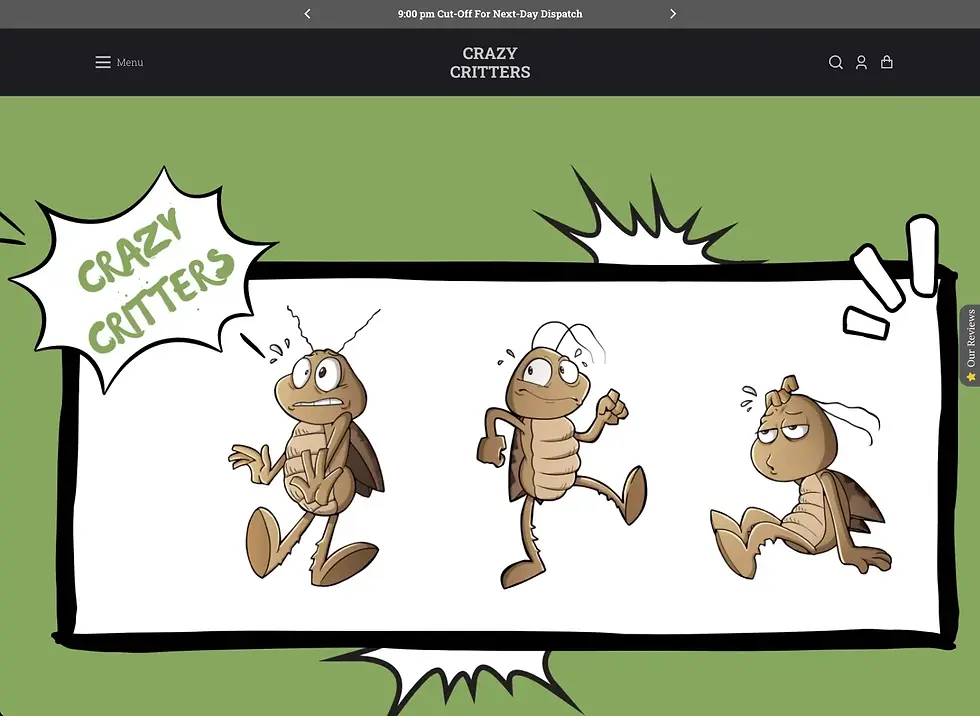
Crazy Critters supplies live feeder insects and subscription services for reptile owners. Their shipping information states that orders are sent on Tuesdays and Wednesdays with a cut‑off of 9 p.m. for next‑day dispatch. Shipping fees are calculated at checkout and orders are delivered across QLD, NSW, VIC, ACT, SA and TAS, with a 100% live guarantee. They do not mention shipping to Western Australia, implying it may not be available. Customers can set up weekly, fortnightly or monthly subscriptions, and packaging is designed to ensure safe transit.
Crazy Critters primarily sells live crickets, wood roaches and black soldier fly larvae. Prices vary by species and quantity, with small packs starting around AU$8–$15. These insects serve as feeder insects rather than targeted pest control agents.
Habitat & pest advice: Do not release feeder insects into the environment. If using them for compost, check species are non‑invasive and will not become pests themselves.
Amazing Amazon (Victoria) - https://www.amazingamazon.com.au
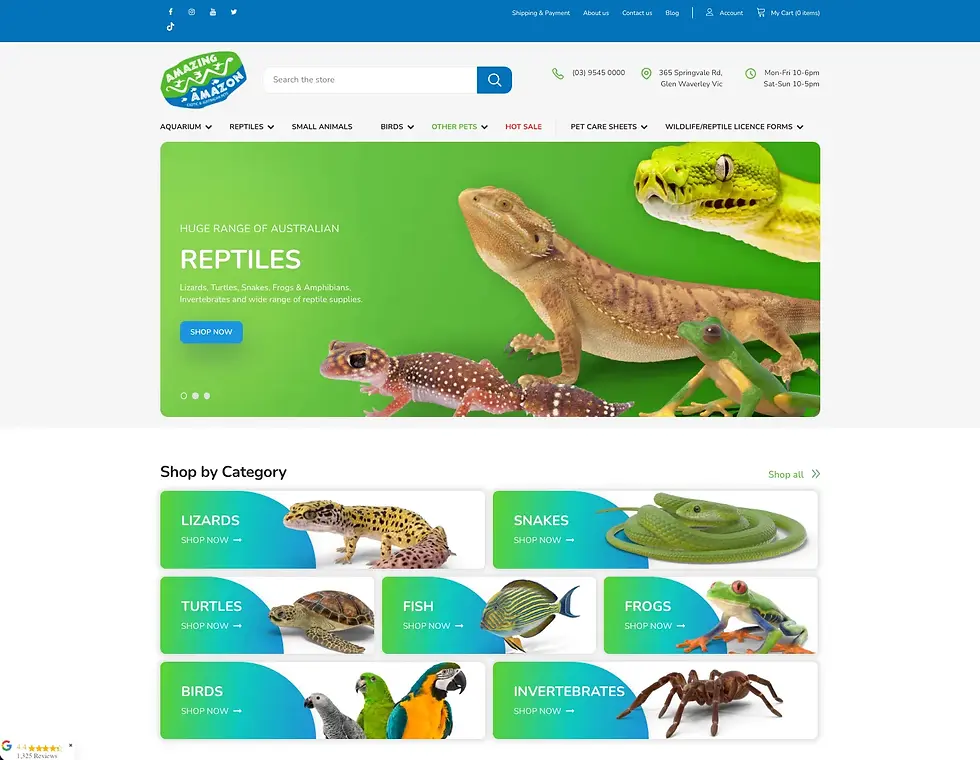
Amazing Amazon is a reptile and aquarium store in Melbourne that also sells live feeder insects. On a product page, medium live crickets (approximately 50 per tub) are priced at AU$9.95. The page emphasizes that live crickets are shipped via express post only to ensure quality and that shipping may be delayed on very hot days. It warns that all items in the order must be sent express when live insects are included. Their general shipping information page says that orders are dispatched from Victoria within 1–2 business days and take 2–5 days to arrive in metropolitan areas (longer for regional areas). They ship across Australia but not internationally.

Amazing Amazon is primarily a pet store rather than a biological control supplier. While live crickets could be released to feed insectivorous birds or small reptiles, they are not recommended for pest control because they may become pests themselves.
Habitat & pest advice: Do not release non‑native feeder insects into gardens; instead, focus on native species and beneficial predators for pest management.
Condensed Summary Table
Conclusion & Next Steps
Using beneficial insects can transform a chemical‑heavy garden into a thriving ecosystem. The retailers profiled here provide access to predators and parasitoids that target specific pests, from aphids and mealybugs to spider mites and soil‑dwelling larvae.
To succeed, match the right insect to your problem, select the correct pack size and release method, and provide habitat support through nectar plants, shelter and moisture. Always check shipping restrictions; for instance, BioWorks cannot send Persimilis to WA https://bioworksonline.com.au, and Outback Bugs does not ship live insects to NT, TAS or WA https://www.outbackbugs.com.au. Consider ordering early in the week to ensure insects arrive alive and in good condition.
Remember that beneficial insects are part of a holistic approach. Combine them with cultural practices such as removing infested plant material, rotating crops, and using row covers to protect seedlings. Use selective, low‑toxicity pesticides only when absolutely necessary and follow label instructions to avoid harming your new allies. If you are unsure about the best species or timing, contact the retailer for advice or consult local extension services. By investing in beneficial insects and supportive habitat, gardeners in Port Macquarie and across NSW can enjoy healthier, more resilient gardens.
Need more advise about natural pest control options?
References & Further Reading
Bugs for Bugs – Lacewing product description https://bugsforbugs.com.au/product/lacewing/
Bugs for Bugs – Spotted ladybird description https://bugsforbugs.com.au/product/spotted-ladybirds/
Bugs for Bugs – Cryptolaemus product https://bugsforbugs.com.au/product/cryptolaemus/
Bugs for Bugs – Trichogramma wasps https://bugsforbugs.com.au/product/trichogramma-pretiosum/
Bugs for Bugs – Cucumeris mites https://bugsforbugs.com.au/product/cucumeris/
Bugs for Bugs – Shipping FAQ https://bugsforbugs.com.au
GoodbugShop – Shipping & Returns https://goodbugshop.com.au
BioWorks – Premium Persimilis product information https://bioworksonline.com.au/product/premium-persimilis/
BioWorks – Hypoaspis product information https://bioworksonline.com.au
BioWorks – Cucumeris product information https://bioworksonline.com.au
BioResources – Adult lacewing shipping information https://bioresources.com.au
Biological Services – Montdorensis mite description https://biologicalservices.com.au
Outback Bugs – Shipping restrictions https://www.outbackbugs.com.au
Minibeast Wildlife – Shipping information https://shop.minibeastwildlife.com.au/pets/
Bug Frenzy – Shipping policies https://bugfrenzy.com.au
Bugs Alive – Shipping restrictions https://bugsalive.com.au
Crazy Critters – Shipping information https://www.crazycritters.com.au
Amazing Amazon – Live crickets product page https://www.amazingamazon.com.au
NSW DPI – Biological control guidelines https://www.dpi.nsw.gov.au



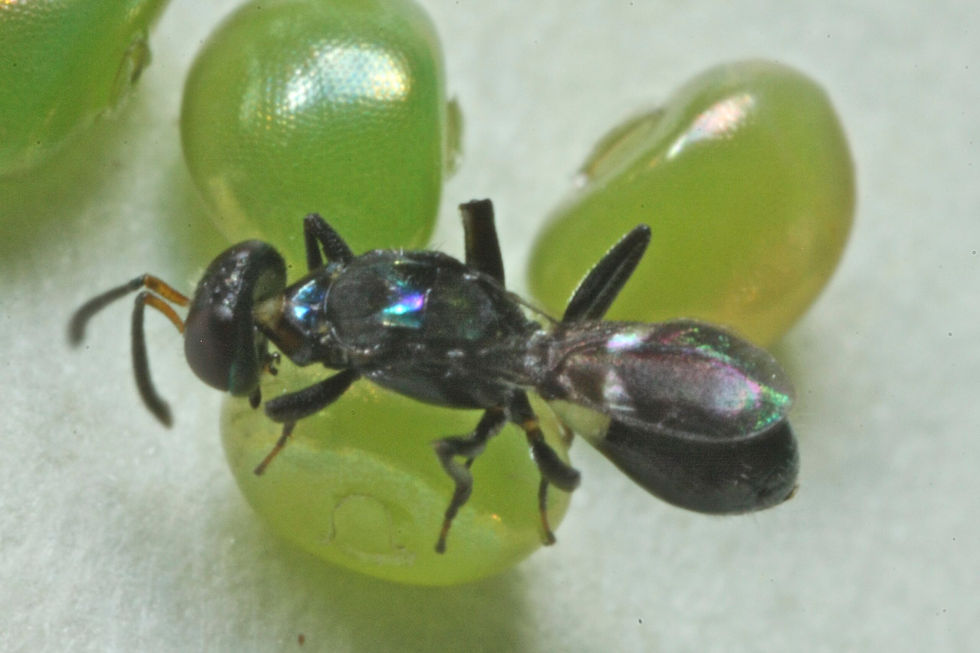
Comments